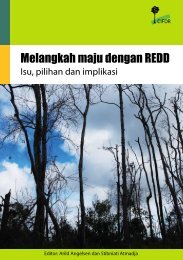Adaptive collaborative management of community forests in Asia ...
Adaptive collaborative management of community forests in Asia ...
Adaptive collaborative management of community forests in Asia ...
You also want an ePaper? Increase the reach of your titles
YUMPU automatically turns print PDFs into web optimized ePapers that Google loves.
Chapter 4: Improv<strong>in</strong>g Forest Quality and Livelihoods <strong>in</strong> Indonesia • 123<br />
Another limitation <strong>of</strong> ACM relates to its communicative learn<strong>in</strong>g. Although<br />
this k<strong>in</strong>d <strong>of</strong> learn<strong>in</strong>g resulted <strong>in</strong> positive changes, only <strong>in</strong> conditions <strong>of</strong><br />
relative equality <strong>of</strong> power did this learn<strong>in</strong>g lead to the formation <strong>of</strong> more<br />
<strong>in</strong>clusive views 14 . In other words, <strong>in</strong> situations <strong>of</strong> balanced power, learn<strong>in</strong>g<br />
transformed stakeholders’ perspectives to become more open and <strong>in</strong>clusive<br />
towards alternative views. For example, <strong>in</strong> Jambi, the orig<strong>in</strong>al women and<br />
the settler women adapted their ways <strong>of</strong> valu<strong>in</strong>g the other group. On the<br />
other hand, where perceptions were affected by severe power imbalances,<br />
transformative learn<strong>in</strong>g hardly occurred. Some Jambi customary regulations,<br />
for example, rema<strong>in</strong> <strong>in</strong>flexible towards settlers.<br />
Lessons learned and discussion<br />
As noted before, the limited success <strong>of</strong> participatory forestry <strong>in</strong>itiatives<br />
<strong>in</strong> Indonesia is due to their <strong>in</strong>adequacy <strong>in</strong> handl<strong>in</strong>g divergent claims on<br />
<strong>forests</strong> and address<strong>in</strong>g the <strong>in</strong>flexibility <strong>of</strong> <strong>management</strong> systems <strong>in</strong> deal<strong>in</strong>g<br />
with complex changes. These shortcom<strong>in</strong>gs are <strong>of</strong>ten reflected <strong>in</strong> paralysis<br />
<strong>of</strong> decision mak<strong>in</strong>g at various forest <strong>management</strong> levels. This section<br />
discusses the lessons we have learned from apply<strong>in</strong>g ACM and highlights<br />
the conclusions we have drawn about whether ACM can do better. Our<br />
discussion focuses on forest decision mak<strong>in</strong>g—the area where we believe<br />
ACM can best contribute <strong>in</strong> Indonesia.<br />
We learned that change is not likely to emerge without sufficient motivation<br />
for people to <strong>in</strong>itiate learn<strong>in</strong>g and <strong>collaborative</strong> action. The need for change<br />
was present at the start <strong>of</strong> the project, but it did not motivate local actors<br />
until facilitated action research encouraged them to develop the confidence<br />
necessary for tackl<strong>in</strong>g problems themselves. This trigger was similar at both<br />
sites: actors were fac<strong>in</strong>g rapid and complex social and political changes,<br />
<strong>in</strong>effective leadership, policies, and <strong>in</strong>stitutions and social disorder.<br />
We also learned that ACM <strong>of</strong>fers to exist<strong>in</strong>g forestry programs a structural<br />
approach to deal<strong>in</strong>g with divergent claims and related complexities.<br />
After all, deal<strong>in</strong>g with such challenges demands work<strong>in</strong>g structurally.<br />
Stakeholders need to work at the system level <strong>in</strong> handl<strong>in</strong>g multiple claims<br />
across different social entities and jurisdictions—factors that can complicate<br />
learn<strong>in</strong>g, engender conflict and prevent collaboration. By improv<strong>in</strong>g the<br />
social organisation among stakeholders, trigger<strong>in</strong>g learn<strong>in</strong>g <strong>in</strong> complex<br />
environments and balanc<strong>in</strong>g power, ACM encourages stakeholders to<br />
organise themselves <strong>in</strong> structures <strong>of</strong> collective decision-mak<strong>in</strong>g.
















